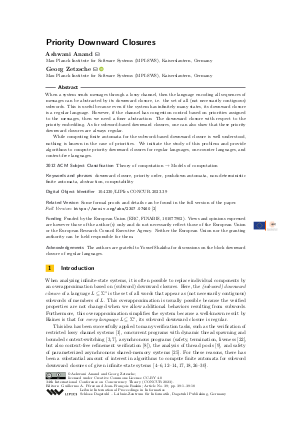@InProceedings{anand_et_al:LIPIcs.CONCUR.2023.39,
author = {Anand, Ashwani and Zetzsche, Georg},
title = {{Priority Downward Closures}},
booktitle = {34th International Conference on Concurrency Theory (CONCUR 2023)},
pages = {39:1--39:18},
series = {Leibniz International Proceedings in Informatics (LIPIcs)},
ISBN = {978-3-95977-299-0},
ISSN = {1868-8969},
year = {2023},
volume = {279},
editor = {P\'{e}rez, Guillermo A. and Raskin, Jean-Fran\c{c}ois},
publisher = {Schloss Dagstuhl -- Leibniz-Zentrum f{\"u}r Informatik},
address = {Dagstuhl, Germany},
URL = {https://drops.dagstuhl.de/entities/document/10.4230/LIPIcs.CONCUR.2023.39},
URN = {urn:nbn:de:0030-drops-190339},
doi = {10.4230/LIPIcs.CONCUR.2023.39},
annote = {Keywords: downward closure, priority order, pushdown automata, non-deterministic finite automata, abstraction, computability}
}

 Creative Commons Attribution 4.0 International license
Creative Commons Attribution 4.0 International license





